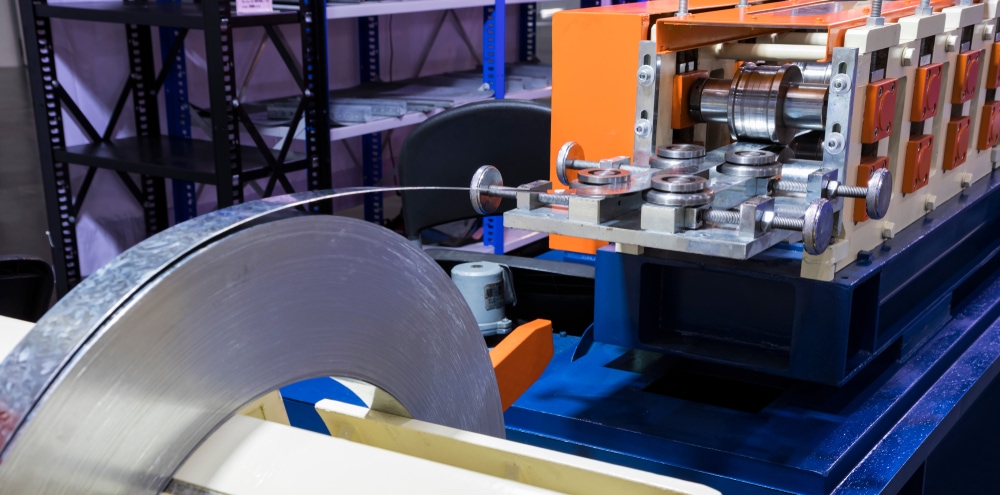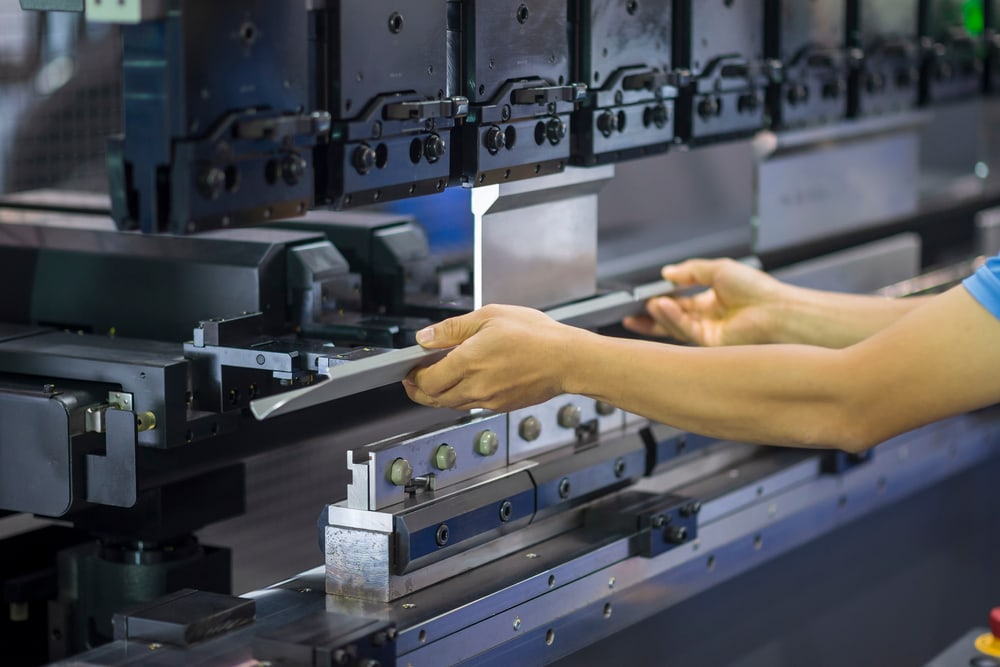Metal Rolling Applications
Leave a CommentWelcome to the world of metal rolling applications! This process is an integral part of manufacturing for many industries, and it can be used for a wide variety of purposes—from light-gauge sheet rolling to heavy gauge plate forming.
Whether you are new to this fascinating technique or looking for insights from an expert’s perspective, here you will find valuable information about the different types of rollers and how the metal rolling process can be used in various applications. Read on to learn more about how this age-old process remains relevant today!
Types of Rolling
Rolling metal is a specialized process that requires precision, carefulness, and the right equipment. Whether creating custom-fabricated parts or manufacturing something for mass production, having a reliable rolling machine can be highly advantageous in consistently achieving accurate results.
Plate rolling
In plate rolling, metal sheets are rolled into cylindrical items like pipes, buckets, and tanker trailers. With its working mechanism, the rolling machine can bend flat sheet metal into large arcs, cylinders, squares, ellipses, and multi-section arcs.
Plate metal rolling can create thinner and stronger metals and is more precise than other methods, meaning less material is wasted during manufacturing.
Angle rolling
Angle rolling is a process used to shape metal into curved or angular shapes. With this process, sharp edges are removed, strength is improved, and benefits are provided functionally and cosmetically. Angle rolling is often used to create pipes, tubes, and other cylindrical objects. It is a popular method for creating metal furniture and other decorative items.
Beam rolling
Steel beams are bent by beam rolling. Bending strength increases with depth cubed by the depth. Due to this, beams are very stiff. That’s why the web’s thickness mustn’t be too thin to prevent buckling.
In addition, beam rolling gradually reduces the thickness of the ingot until it reaches the desired thickness. It can create beams of any size and shape, making it an extremely versatile process.
Tube rolling
Tube rolling is a process used to create cylindrical tubes from flat metal sheets. The process involves passing the flat sheet of metal through a series of rollers, each of which progressively bends the metal until it takes on the desired shape.
The main advantage of tube metal rolling over other methods of tube fabrication is that it is much faster and more efficient. Additionally, the process can be easily automated, which further increases efficiency.
Custom Metal Rolling Applications
From sizeable industrial performance parts to small custom components, metal rolling can provide various options for companies seeking mass production and one-off solutions. Whether you need a specific component for the latest construction project or an artistic piece as part of a creative build, this process can be tailored to meet your needs.
Military-grade metal parts for land, sea, and air
The ballistic limit test is a special test conducted on military grades. Ballistic testing uses a controlled projectile, firing pattern, and velocity to determine the velocity at which a target will be penetrated entirely and partially.
Typically used in defense applications, MIL-12560 armor absorbs shock exceptionally well, making it a popular military-spec armor. With our iron and aluminum products that are highly sought after for their extreme toughness, lightweight construction, and durability, we ensure you will get the best quality metal parts that are military grade standard.
Custom cyclone setups for the recycling industry
Cyclone separators are used to remove particulates from flue gases. An easy-to-empty container beneath the cyclone collects up to 99% of airborne waste. Our custom metal rolling is perfect for this industry due to its efficient and thorough processing services in collecting plastic particles that will maximize the potential of each component.
Hospital and prison-grade structural components
Paramount Roll & Forming’s commitment to providing quality fabricated steel to hospitals and prisons makes us successful. Our services benefit prisons that use steel for structural components and high-security doors and frames. Meanwhile, we also provide hospitals with metal parts for their steel structural components that limit noise and have vibration control.
We provide a complete service from start to finish, from design to fabrication, ensuring that your vision perfectly meets your specifications. Every step is carefully monitored, inspected, and evaluated to provide a superior outcome.
Our metal rollers utilize computer-guided methods that ensure accuracy and precision – no detail is too small to be overlooked, and every part is customized to meet specific needs and requirements.
Custom Metal Bending from Paramount Roll and Forming
As California’s first pipe roller in 1963 and today, a full-service provider of custom metal fabrication, Paramount Roll and Forming specializes in metal bending and rolling services.
Custom metal assemblies and structures are one of our core specialties – having over six decades of experience in metal bending and can handle virtually any project. We can bend and make channels, plates, tubes, beams, and channels out of aluminum, steel, and other high-performance alloys.
Contact us today to learn more about our custom metal bending services and get started on your next project.
Custom Metal Bending Overview
Leave a CommentCustom metal bending is an in-demand manufacturing process widely used in different industries. Some of the most common applications are in Automotive Production, Architecture, Aerospace Industry, and any application that requires a unique shape.
The process has been refined over centuries to offer precision and accuracy. It is an essential part of the manufacturing process for many products, as it allows for the creation of complex shapes and designs that would be impossible with other production methods.
To give you more details, here’s an overview of the types of custom metal bending and how businesses use the process to create custom components from sheet metal.
Custom Metal Bending: Types
Custom metal bending is the process of bending metals to a predetermined shape for various applications. It involves applying force to it to shape it, depending on the type of material being used. The most common custom metal bending techniques are:
Air Bending
Air bending is one of the most popular and preferred types due to its numerous benefits. The process involves pressing a punch into the material, forcing it into a bottom V-die mounted on the press.
Additionally, the least amount of contact is made with air bending, as it only touches three points: punch, tip, and die shoulders. Its main advantage is that less weight is required due to the punch tip not being pushed past the metal’s surface.
Bending/Bottoming
Air bending and bottom bending are different due to their radius. It differs from coining, where the punch and tie aren’t making contact with the material. And there’s not enough tonnage to make an imprint on the material.
Some of its many advantages are that it has better accuracy and fewer spring-backs when utilizing the tooling. As a result, it’s one of the safest methods around.
Coining
Coining is a process where the top tool forces the material into the bottom die with more tonnage required, which is about five to 30 times the force of air bending. It results in a controlled angle with fewer spring-backs.
Its advantages include outstanding results due to high accuracy. Plus, spring backs are less likely to occur. Therefore, the material won’t return to its original state compared to other methods.
Custom Metal Bending: Induction Bending
Induction bending, also known as hot, incremental, or high-frequency bending, is a piping technique that is both precise and efficient. Any materials, such as pipes, tubes, and structural shapes, are bent efficiently through this method.
Furthermore, induction bending is preferred for bigger pipe diameters. Local heating with high-frequency induced power is used or applied during the process.
Benefits of Induction Bending Compared to Cold Bending
- Keeps ovality and thinning percentages critical for passing inspection processes needed in different industries, such as Petrochemical, Oil & Gas, and Power Plants
- Allows for variable radii from large to small, even on specific bending requirements as tight as a 1.5D radius
- Stronger parts
- Smaller tooling requirements
- Lower material costs
- Cleaner and more efficient operations
- Time-saving
Custom Sheet Metal Rolling
Sheet metal is a material that’s formed through a manufacturing process to produce thin, flat sheets. The process involves passing a metal stock through one or more spinning rolls to reduce the thickness of the material and ensure that they are uniform. Other times, rolling can impart a desired mechanical property.
One of the basic shapes used in metalworking is sheet metal, available in flat pieces or coiled strips. Numerous objects are made with sheet metal since they can be cut and bent into unlimited applications. These are machine components, machine guards, ductwork, wall coverings, tank bodies, and many more for various industries.
Custom Metal Bending from Paramount Roll and Forming
Paramount Roll and Forming started as California’s first pipe roller and eventually expanded its operations. Now, it has become a full-scale custom metal fabrication provider that offers custom metal bending, induction bending, and sheet rolling processes for customers with specific requirements and needs.
Our Capabilities
- Beam bending
- Angle bending
- Channel bending
- Square and rectangular tube bending
- Plate rolling
- Angle rolling up to 10 inches x 10 inches x 1 inch
- Beam rolling up to 36 inches
- Tube rolling up to 18 x 18 inches
- Mandrel bending up to 10 inches SCH 80
Unique parts and components our products create
- Custom spiral staircases for both indoor and outdoor structures
- Railings, fences, and facades
- Military-grade metal parts for land, sea, and air
- Custom cyclone setups for the recycling industry
- Hospital and prison-grade structural components
- Sculptural outdoor metalworks (patio covers, porticos, and more)
- Integrated art and design components
- Specialty tubing for fencing, gates, and enclosures
So if you have any questions or queries about our products and custom metal bending services, don’t hesitate to contact us. You can also request a quote to get started on your next project.






